-
Understanding Low Vision
For some people, corrective eyewear and eye surgery cannot improve their vision. If someone you know has an eyesight problem that cannot be fixed through vision correction options like LASIK , contact lenses, or eyeglasses, then his ophthalmologist in Chicago may diagnose him with low vision. Watch this video to learn more about what it means to have and live with low vision.
Having low vision can make it difficult to complete everyday tasks like driving, shopping, reading, watching TV, and recognizing faces. Because there are many causes of low vision, people can be affected by low vision in various ways. While one person’s condition may affect her central vision or contrast sensitivity, another person’s may impact his depth perception or peripheral vision.
-
What Are the Risk Factors for Glaucoma?
When was the last time you visited your optical center in Chicago to have your eyes tested for glaucoma by an eye doctor? If it’s been more than a couple of years, then you could be overdue for a screening. Read on to learn what puts you at greater risk for developing glaucoma.
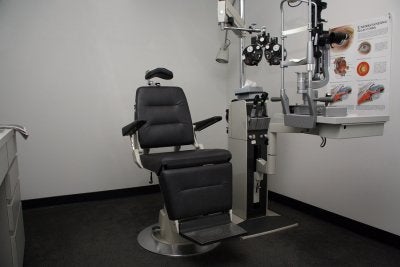
Age
Individuals over 40 are at a higher risk for both open-angle glaucoma (OAG) and closed-angle glaucoma (CAG), and your age impacts how frequently you should be seeing an eye doctor for testing. People under age 40 should visit an eye care professional every 2 to 4 years. From ages 40 to 54, see your eye doctor every 1 to 3 years. Individuals who are between ages 55 and 64 should have their eyes tested every 1 to 2 years. Once reaching 65 years of age, people should visit their eye doctor once every 6 to 12 months.
Race
Race has been linked to different types of glaucoma. People of African descent are at a higher risk for developing OAG than Caucasians, and people with East Asian ancestry are more likely to suffer from CAG than other individuals. Also, Hispanics in older age groups are at a greater risk for glaucoma. If you fall into one of these high-risk groups, then consider seeing your eye doctor more frequently.
Family History
OAG is the most common form of glaucoma, and both it and CAG are hereditary conditions. This means that if you have immediate family members who suffer from glaucoma, that you should be seeing an eye doctor for testing more frequently than you would otherwise because you have a much greater risk of developing the disease.
Other Factors
There are several other factors that can increase your risk for open-angle glaucoma which include having high pressure in the eyes, having diabetes, and having prior loss of vision due to glaucoma. Additional risk factors for closed-angle glaucoma include being female, having farsightedness, and having CAG in one eye. If any of these risk factors apply to you, then speak with your ophthalmologist about how often you should have your eyes checked for glaucoma.
-
Keeping Your Eyes Safe This New Year’s Eve
Your ophthalmologist near Chicago will tell you that the holiday season can be particularly hazardous for the health of your eyes. To help avoid an accident, continue reading to learn how to practice good eye care this New Year’s Eve.

Champagne
If you’re like most people, then you intend to ring in the new year with a champagne toast during your holiday party. To make a great impression on your guests, learn how to open a champagne bottle like a pro, something which does not involve flying corks. The uncontrolled release of a cork from a bottle of sparkling wine or champagne can reach up to 50mph, making it a serious eye hazard, according to eye doctors. You can help protect everyone’s eyes at your party by learning to safely open champagne.
Fireworks
A frequently underestimated New Year’s Eve tradition, the use of sparklers is one of the leading fireworks-related causes of emergency trips to an eye doctor. For this reason, their use should be approached with the same level of caution as fireworks. To use sparklers safely this holiday, only light them outdoors, light only one at a time, point sparklers away from your face and those of others, and always keep a bucket of water nearby. As for fireworks, do not touch unexploded fireworks, always wear protective gear when handling fireworks, and respect all safety barriers at fireworks shows.
Poppers
For many people, a New Year’s Eve party is lacking if there aren’t party poppers involved. If you plan to celebrate with party poppers this holiday, keep in mind that they can cause eye injuries if they aren’t used with caution. First, always point party poppers away from your face and those of others. Second, avoid trying to fix poppers that turn out to be duds because there is a chance that they will explode in your face while you’re working on them. Finally, never allow children to use party poppers alone and be sure to instruct them on their safe and proper use.
-
How to Provide Your Eyes with Sun Protection
Your eye doctor will tell you that consistent eye care is key for promoting sharp vision long-term. Many people realize the importance of protecting their skin from the sun, but they never think to provide the same for their eyes. To practice good eye care near Chicago, watch this video for some helpful tips on protecting your eyes from UV rays.
When your eyes lack sun protection, this can lead to vision loss, cataracts, wrinkles around the eyes, and eye and eyelid cancer. For these reasons, eye doctors recommend that people wear sunglasses with dark lenses that completely cover their eyes and block 99% of both UVA and UVB rays. Also, wearing a wide brimmed hat, wearing contact lenses that have UV protection, using sunscreen, and staying in the shade between 10 am and 4 pm can help protect your eyes from the sun.
-
Tips for Preventing Dry Eye Symptoms This Season
Once the cold, dry weather of winter arrives, many people are forced to make changes to keep their eyes comfortably lubricated. If you’re thinking about visiting your eye doctor in Chicago about dry eye treatment, then continue reading to learn what else you can do to prevent dry eye symptoms this season.
While outdoors, dry winter winds can take quite a toll on your eye lubrication, so consider wearing sunglasses during the day and glasses at night when you head outside. Additionally, wearing contact lenses for extended periods of time can lead to dry eye symptoms, so consider favoring your eyeglasses more during the winter and wearing your contact lenses for shorter durations.
Getting enough fluids is important for your overall health year-round but is particularly significant when you want to prevent your eyes from feeling dry and gritty. Also, if you want to avoid dry eye symptoms, then be sure to include plenty of vitamins A, C, and E in your diet this season, as well as foods containing omega-3 fatty acids. Finally, if the air in your home feels dry, run a humidifier as often as necessary to keep your indoor humidity levels within a comfortable range.
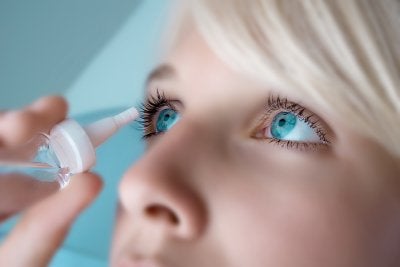
-
Caring for Your Eyes When You Have Diabetes
Regularly seeing an eye doctor is important for everyone, but even more so for people with diabetes. Read on to learn why you should regularly see your ophthalmologist near Chicago and what else you can do to practice good eye care when you have diabetes.
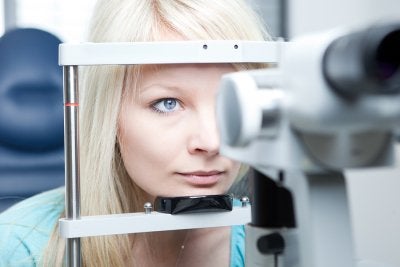
Control Your Blood Sugar
Diabetes is a condition that is characterized by high blood sugar and problems with blood sugar regulation. When there is too much glucose in your blood, this can cause damage to your body, which includes the tissues of your eyes. For this reason, maintaining healthy blood sugar levels is an important part of protecting your vision when you have diabetes. Doing this can help protect the blood vessels in your eyes and slow the progression of eye diseases. See your doctor at least twice per year for an A1C blood test, which measures what your blood glucose levels were for 2 or 3 months prior.
Manage Your Blood Pressure
High blood pressure can also be a contributing factor when it comes to diabetes and eye health. To help slow and prevent eye diseases that can be caused by diabetes, maintain healthy blood pressure levels by moderating your sodium intake, exercising, and staying at a healthy weight. If these practices aren’t enough to keep your blood pressure levels healthy, then ask your doctor about medications that help regulate blood pressure. To practice good eye care, aim for blood pressure that is under 140/80.
Visit Your Eye Doctor
Annual eye exams give your eye doctor a chance to catch the early signs of eye disease, something that is particularly important for people with diabetes. Many diabetics develop an eye problem called diabetic retinopathy, a condition that is a complication of diabetes and that can lead to blindness if left untreated. The early stages of this eye disease typically cause no symptoms, so seeing your doctor at least once per year for a comprehensive dilated eye exam is critical for protecting your eyes when you have diabetes.
-
Understanding Glaucoma
Sometimes referred to as a silent thief of sight, glaucoma is a serious eye condition that can affect your vision and even lead to blindness. If you’re wondering what impact this disease might have on your eye care near Chicago, then watch this video to learn more about glaucoma.
In the United States and worldwide, glaucoma is a leading cause of blindness, occurring when fluid buildup in the eyes causes compressive damage to the optic nerves. This condition is sometimes called a thief of sight because patients typically experience no symptoms until they have already lost a significant amount of their vision. For this reason, eye care professionals recommend that people regularly visit their ophthalmologist or eye doctor for checkups.
-
Comparing Cataract and ICL Surgery
Are you exploring your options for vision correction near Chicago? If so, then your eye doctor may recommend cataract or ICL surgery. A cataract is a cloudy area on the lens of the eye, and cataract surgery involves the removal of the eye’s natural lens after it becomes clouded by a cataract. An intraocular implant (IOL) can then be placed where the natural lens once sat. For patients where the use of an IOL is not possible, eyeglasses or contact lenses must be worn to focus light coming into the eye following cataract surgery.
On the other hand, some people experience poor vision due to refractive errors, meaning that they struggle to see things that are near, far, or both. Contact lenses and eyeglasses are traditionally used to correct these vision problems, but Visian ICL surgery offers another solution. Unlike cataract surgery, which requires the removal of the eye’s lens, Visian ICL surgery involves the placement of an IOL in front of the patient’s natural lens so that the 2 lenses can work together to correct the person’s refractive errors. Speak with your eye doctor to learn if cataract of Visian ICL surgery could be right for you.
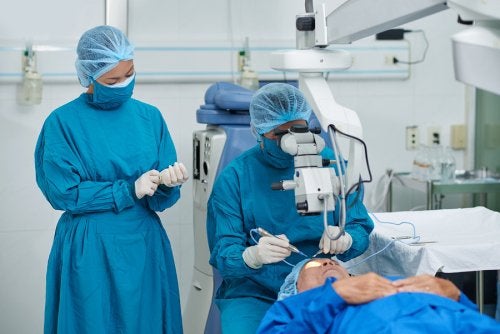
-
Answering Common Questions About Diabetic Retinopathy
If you have diabetes, then your eye doctor in Chicago may speak with you about diabetic retinopathy, an eye problem that can affect diabetics. Continue reading to learn the answers to common questions about diabetic retinopathy.
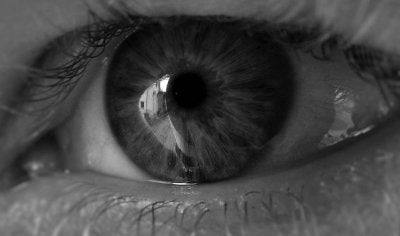
What is diabetic retinopathy?
In people with diabetes, progressive damage to the retina, which is the lining at the back of the eye that is sensitive to light, is what ophthalmologists refer to as diabetic retinopathy. This condition is a serious complication of diabetes that can threaten your eyesight.
What causes diabetic retinopathy?
When you have diabetes, your body’s ability to use and store glucose (sugar) is affected, a problem which can lead to high blood sugar levels. When your blood has too much sugar in it, this can cause damage to your tissues, including those of your eyes. Over time, diabetes can harm the blood vessels of each retina, causing blood and other fluids to leak out. As the retinal tissue swells with these fluids, blurred or cloudy vision can result. When left untreated, diabetic retinopathy can eventually lead to blindness.
What are the symptoms of diabetic retinopathy?
When diabetic retinopathy develops, the individual may experience any of several symptoms that include blurred vision, trouble seeing at night, seeing floaters or spots, and having an empty or dark spot in the field of vision. If you notice any of these symptoms, see your eye care professional right away. Although vision loss that results from this condition can be irreversible, early detection can significantly reduce your risk of blindness.
What can I do to prevent diabetic retinopathy?
This eye condition frequently develops without any early warning signs. For this reason, it’s critical to see your eye doctor at least once per year for a comprehensive dilated eye exam. Also, controlling your diabetes can slow the onset and progression of diabetic retinopathy, so work with your doctor to help keep your blood sugar and blood pressure at healthy levels.
-
Cosmetic Lenses and Your Eye Health
Are you looking for cosmetic contact lenses in Chicago to complete your Halloween costume? If so, you’re not alone. Cosmetic lenses are a popular costume accessory that can be safe and fun. However, there are some important facts that you should know about when it comes to these contact lenses and your eye health.
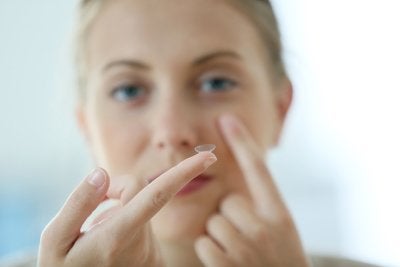
What are cosmetic lenses?
Designed to change the appearance of a person’s iris in some way, many people enjoy wearing cosmetic lenses day-to-day and for special occasions. For example, cosmetic lenses can make a person’s green eyes look a bit greener, make the entire iris appear black, or make the pupil appear the same shape as a cat’s. However, the most important thing that you should know about cosmetic lenses is that they are medical devices and should be approached in the same way that a pair of corrective lenses would be approached.
How do I get cosmetic lenses?
Because cosmetic lenses qualify as medical devices, they require FDA approval and an up-to-date contact lens prescription from an eye doctor to be sold in the United States. This means that even if you do not need prescription eyeglasses or contact lenses to see well, that you will need to visit an optical center to get a prescription if you want to wear your cosmetic lenses safely. Once you have your contact lens eye prescription, you can purchase the contacts of your choice from an FDA approved company.
Why are cosmetic lenses considered medical devices?
In the past, you could find contact lenses being sold as “one size fits all” in costume and novelty stores. The problem with this is that eyes are not the same shape from person to person, and even a single individual can have eyes that are not identical in shape. When you wear contact lenses that do not fit your eyes, this can lead to infections and permanent eye damage. For these reasons, you must purchase and care for cosmetic lenses in the same way you would a prescription pair.
